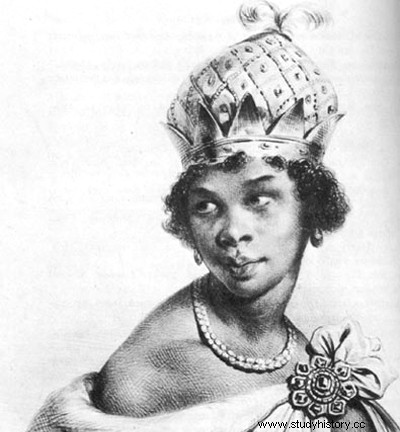Ana de Sousa Nzinga Mbende, known as Queen Nzinga Mbende, is a queen of kingdoms Ndongo and Matamba, of the Ovimbundu people, in Angola.
An emissary for peace
 Nzinga Mbende, born in 1583, is the daughter of King Ngola Kiluanji and Kangela. According to tradition, her name comes from the fact that she was born with her umbilical cord around her neck, a characteristic supposed to indicate a proud and haughty character. She has two sisters, Kifunji and Mukambu, and a brother, Ngola Mbande. Favored by her father, Nzinga observes him ruling the kingdom and accompanies him to war.
Nzinga Mbende, born in 1583, is the daughter of King Ngola Kiluanji and Kangela. According to tradition, her name comes from the fact that she was born with her umbilical cord around her neck, a characteristic supposed to indicate a proud and haughty character. She has two sisters, Kifunji and Mukambu, and a brother, Ngola Mbande. Favored by her father, Nzinga observes him ruling the kingdom and accompanies him to war.
In the 16th century, France and England threatened Portugal's position in the slave trade and the Portuguese consolidated their power in Angola. His brother-turned-king, Ngola Mbende, wants to induce the Portuguese to remove a fortress built on his lands and return to him some of his subjects held captive. In 1621-1622, he sent his sister as an emissary at a peace conference with the Portuguese governor João Correia de Sousa in Luanda. According to legend, the Portuguese governor did not offer him a chair but a floor mat for negotiations, a treatment reserved for subordinates in Ovimbundu customs. Nzinga then allegedly ordered a servant to kneel on the ground so that she could sit on his back, placing herself as the governor's equal.
Nzinga managed to obtain a peace treaty with Portugal and converted to Christianity, adopting the name Dona Anna de Sousa, perhaps to strengthen these ties. However, the Portuguese do not respect the treaty and Ngola Mbende commits suicide. Nzinga then ensures the regency for his nephew, Kaza. Rumors then accuse him of having poisoned his brother and then murdered his nephew to secure power. She takes the title of Queen of Andongo and fights the Portuguese. In 1629, one of his sisters was captured by the Portuguese.
The war against Portugal
In 1641, the Dutch, allied to the Kingdom of Kongo, took Luanda. Nzinga Mbende sends them a diplomatic mission and concludes an alliance with them against the Portuguese. In 1644, she defeated the Portuguese army at Ngoleme but was defeated in turn at Kavanga two years later. In the battle, her second sister is captured, her links with the Kingdom of Kongo are revealed as well as the espionage practiced by her captive first sister. In retaliation, the Portuguese drowned the spy, but other sources report that she managed to escape.
Thanks to Dutch reinforcements, Nzinga stood up to the Portuguese and continued to lead her troops into battle herself. In 1657, at the age of 74, she finally signed a peace treaty with Portugal. After the war, she tries to rebuild her country, takes care of resettling former slaves and, having no sons, manages her estate.
His natural death, on December 17, 1663, accelerated the process of Portuguese domination in South West Africa. She is known in Angola for her keen sense of politics, diplomacy and military tactics.
